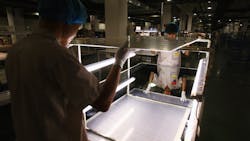China December Manufacturing Index Falls to 7-month Low
China's manufacturing activity worsened in December with HSBC's closely watched purchasing managers' index (PMI) hitting a seven-month low, the bank said Tuesday, signaling more weakness in the world's second-largest economy.
The British banking giant's preliminary PMI for the month came in at 49.5, below the break-even point dividing expansion and contraction, the bank said in a statement.
The result, compiled by information services provider Markit, was lower than November's final reading of 50.0 and the weakest result since May's 49.4. The December reading also marked the first move into the contraction range in seven months.
The index tracks activity in China's factories and workshops and is a closely watched indicator of the health of the Asian giant, a key driver of global growth.
"The manufacturing slowdown continues in December and points to a weak ending for 2014," Qu Hongbin, HSBC's chief economist for China, said in the statement.
"The rising disinflationary pressures, which fundamentally reflect weak demand, warrant further monetary easing in the coming months."
HSBC will publish its final reading for December on Jan. 2, it said.
The government on Friday announced that industrial output expanded at its slowest pace in three months in November, while retail sales and fixed asset investment data also pointed to weakness.
China Economy at 'New Normal'
The data came after a key annual meeting last week where China's top leaders stressed the need to adapt to the economy's "new normal" -- an increasingly popular official expression for slower but more sustainable growth.
Nomura economists said that the release, the first covering data for December, does not bode well for other statistics due out for the month.
"The greater-than-expected decline in the flash PMI raises the possibility that December data will disappoint," they wrote in a reaction, having expected a reading of 50.1.
"We expect more policy easing to help stabilize growth and to achieve the annual growth target of around 7.5% for 2014."
Julian Evans-Pritchard, China economist at Capital Economics, said that while analysts expect more interest rate cuts and liquidity injections, no one should count on such moves to drive a rebound next year.
"While policymakers want to prevent a sharp drop off in growth, structural rebalancing goals and concerns about credit risks mean that they are likely to allow the economy to gradually slow further over coming quarters, particularly given the recent resilience of the labor market," he wrote in a note.
Chinese authorities have committed themselves to rebalancing the economy as it further matures to one in which the country's increasingly prosperous consumers drive growth, even if at a slower rate.
Jobs are a key component of that strategy in the world's most populous nation. Premier Li Keqiang has said that authorities can accept a growth rate on the lower side of the targeted "about" 7.5% for this year so long as employment remains strong.
Copyright Agence France-Presse, 2014
About the Author
Agence France-Presse
Copyright Agence France-Presse, 2002-2025. AFP text, photos, graphics and logos shall not be reproduced, published, broadcast, rewritten for broadcast or publication or redistributed directly or indirectly in any medium. AFP shall not be held liable for any delays, inaccuracies, errors or omissions in any AFP content, or for any actions taken in consequence.
